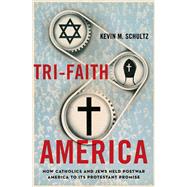Tri-Faith America How Catholics and Jews Held Postwar America to Its Protestant Promise
, by Schultz, Kevin M.- ISBN: 9780199987542 | 0199987548
- Cover: Paperback
- Copyright: 1/15/2013
President Franklin D. Roosevelt put it bluntly, if privately, in 1942-the United States was "a Protestant country," he said, "and the Catholics and Jews are here under sufferance." InTri-Faith America,Kevin Schultzexplains how the United States left behind this idea that it was "a Protestant nation" and replaced it with a new national image, one premised on the notion that the country was composed of three separate, equally American faiths-Protestants, Catholics, and Jews. Tracing the origins of the tri-faith idea to the early twentieth century, when Catholic and Jewish immigration forced Protestant Social Gospelers to combine forces with Catholic and Jewish relief agencies,Tri-Faith Americashows how the tri-faith idea gathered momentum after World War I, promoted by public relations campaigns, interfaith organizations, and the government, to the point where, by the end of World War II and into the early years of the Cold War, the idea was becoming widely accepted, particularly in the armed forces, fraternities, neighborhoods, social organizations, and schools. Tri-Faith Americaalso shows how postwar Catholics and Jews used the new image to force the country to confront the challenges of pluralism. Should Protestant bibles be allowed on public school grounds? Should Catholic and Jewish fraternities be allowed to exclude Protestants? Should the government be allowed to count Americans by religion? Challenging the image of the conformist 1950s, Schultz describes how Americans were vigorously debating the merits of recognizing pluralism, paving the way for the civil rights movement and leaving an enduring mark on American culture.







